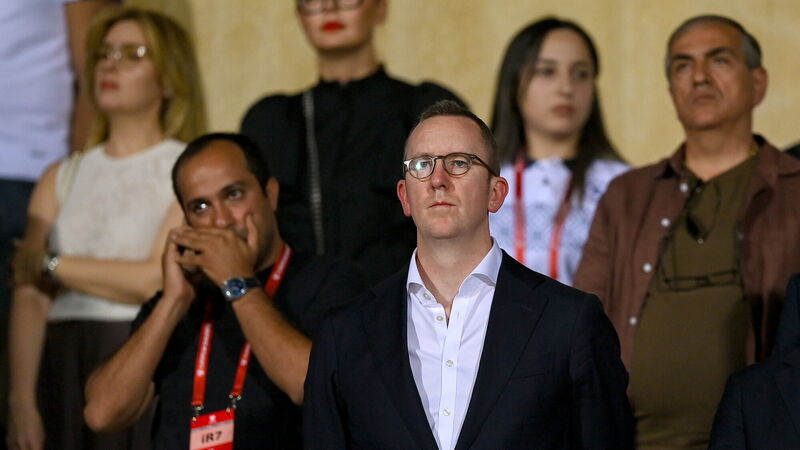John Fallon: FAI can bemoan timing misfortune but sometimes you make your own bad luck

FAI chief executive officer David Courell during the FIFA World Cup 2026 Group F qualifying match between Armenia and Republic of Ireland. Pic: Stephen McCarthy/Sportsfile
TIMING is everything and David Courell is entitled to claim he’s a victim of it when delivering his FAI chief executive briefings.
April’s scheduled sitdown with the media was overshadowed by the bombshell of his chief football officer Marc Canham lodging his resignation 48-hours earlier.
His next interaction was pencilled in for last Friday, just three days after Ireland’s meltdown in Armenia.
Perhaps he hasn’t envisaged the World Cup qualification bid lasting shorter than Joanna Donnelly’s presidential campaign but it made for a bumpy opening.
The Comical Ali element, indelibly linked to FAI dramas, was provided on this occasion by the presence of Eileen Gleeson sat within 50 yards of Courell down the Abbotstown corridor.
She was officially without duties when lodging an equality case against her employers but has returned to the office in a new role while her action — and the allegations therein — dominate public discourse.
There’s so much afoot around Irish football and its governance that an hour’s worth of questions and answers couldn’t cover all bases.
Some replies were more enlightening than others but the spectre of another doomed tilt at hitting the jackpot of a major tournament weighed heavily.
While Courell admitted a ballpark figure is in mind for the eventual cull of staff from the current levels 245, FAI finances will determine the final number.
Covid-19 subsidies from the State contributed to the FAI reducing their debt from €63m to €40m but it’s been stagnant since and the absence in World Cup prize-money of €11m, plus ancillary benefits doubling the bounty by conservative estimates, would contribute to the plateau.
Granted, eight-figure revenues are due from co-hosting Euro 2028 but the real income is derived from being part of the tournament.
That’s not a given either, considering Wales, Scotland, and Ireland will be jostling for two golden tickets if they don’t qualify on the pitch.
Until that potential windfall arrives, the FAI are braced for austerity.
It’s no coincidence that the timeline from voluntary to compulsory redundancies is in tandem with the qualifying campaign. Projections for 2026 cashflow, or the lack of it, will be known by November.
Project Acorn, as it was initially entitled internally, has been ongoing for months and contains a provision for up to a third of the workforce to be shed.
Corporate terminology relating to modernisation and agility will be spouted, yet this cannot be masqueraded as anything other than a cost-cutting exercise on spend which was allowed to spiral.
Post-mortems on the causes are underway with fingers jabbed in various directions.
Facts will decree that this period of the ‘New FAI’ — as in, post John Delaney — began with a staff headcount of 199. Six years later and it’s increased by 25%.
Alarmingly, based on the latest available data from the 2023 accounts of the wage bill spiking to €15.3m, the average salary paid to the 21 newcomers was €141,000.
Courell admitted salaries increased further in 2024 — the level of which will be discovered in the imminent published 2024 accounts — but its 27% of cost share is out of sync with European norms.
When pressed on the mismanagement around this, the CEO cited necessary personnel additions for the FAI Connect IT system and the head of women’s and girls’ football.
Courell was appointed chief operating officer in early 2022, promoted to succeed Jonathan Hill last October.
That rationale, though, doesn’t appear to tally.
Connect is a centralised registration system, applying a charge on players that has risen to €4 each annually. Income close to €1m is generated yearly, a meaty wedge to offset staffing. They’d hardly be commanding six-figure wages.
Gleeson was not the inaugural head of female footballers. Sue Ronan combined that role with managing the women’s senior team until the 2017 appointment of his replacement Colin Bell upgraded it to standalone permanent.
When it is factored in that a bulk of the development officers working at ground level nationwide are co-funded by local authorities, and the increased State funding from the 2020 bailout was earmarked for development, the spotlight shines on managerial layers.
To add further dismay to employees facing a bleak future, this ‘transformation plan’ was crafted with the help of external specialists.
Courell confirmed more than one company was retained but CAA Portas were the figureheads.
Their partner Nic Coward has been operating around the FAI since Hill brought him onboard for the Football Pathways Plan creation.
Those financial statements, albeit nine months in arrears, will demonstrate the extent to which the FAI relied on consultants and agencies to steer them. Public relations and legal dominate the outlay but marketing splurges tested budgetary levels in 2024.
Now the rank and file are expected to bear the brunt for indiscipline elsewhere. That Courell withdrew from talks with Siptu at 24 hours’ notice, via a colleague, has contributed to a sense of an upstairs/downstairs culture pervading.
Next Wednesday’s grilling before an Oireachtas hearing is gearing up to be another public inquisition.
That visit could have been completed at the start of the summer were it not for FAI hesitancy. One example where timing was within their control, only to be spurned.
FAI board term limits to be discussed
Term limits for FAI board members was a contentious facet of the John Delaney era when it resembled the old boys club.
Now the topic will be debated again and voted upon at the emergency general meeting on October 4.
Back in the days when the chief executive was also a director, Delaney served for 18 years.
His loyalists Eddie Murray, Michael Cody, Páraic Treanor, and Jim McConnell entered their 15th year of directorship and Donal Conway a year less before the castle crumbled in 2019.
Government fears of inertia triggered a maximum nine-year limit across sporting organisations and the FAI want to increase theirs by a year to reach that threshold.
Under the proposals put to the 145-member General Assembly, each term for the president, vice-president, and 12 directors will increase from the current two years to three years. Each can serve three terms.
Among the selling points for the change detailed in the FAI pitch is the current restrictive time to build relationships with Uefa and dissuading potential new directors.
Special resolutions require a 75% majority to be carried.
Reservations already being ventilated within the three chambers indicate a challenge on the FAI’s hands for success.
Nine directors are up for ratification at the annual general meeting to be held on November 9.
All five of the footballing board members — Paul Cooke seeking a second presidential term, Dave Moran switching to vice-president, as well as Tom Browne and Nixon Morton — are unopposed.
Kerry native Ger Nagle has been nominated unanimously by the provincial bodies to succeed Moran as the amateur sector representative.
Semi-final venue relief for FAI and RTÉ
Both the FAI and RTÉ may have kept their relief at the outcome of Sunday’s FAI Cup semi-final draw to themselves.
Kerry’s fairytale run to the last four has been the best story of the competition for years, but their Mounthawk Park venue would have presented a litany of challenges had Colin Healy’s side been drawn at home.
The League of Ireland’s newest club can cater for a mere 1,200 fans in Tralee, posing a major ticket shortage for home and away fans of the semi-finalist.
Notwithstanding the loss of league broadcasting rights to Virgin Media, RTÉ always broadcast live the two semi-finals.
For the stadium to be ready to cater for the needs of various cameras, a significant cost was forecasted.
That scenario didn’t come to pass as Kerry were drawn away to Premier leaders Shamrock Rovers at the 10,500-capacity Tallaght on October 5 in the pairings conducted by pundits Alan Cawley and Stuey Byrne.
Completing the separation of Munster and Dublin teams, Cork City will host St Patrick’s Athletic two days earlier.
Turner’s Cross should be full to its 7,000 capacity while the November 10 final at the Aviva Stadium is shaping up to exceed the 43,881 record that was set in 2023.



